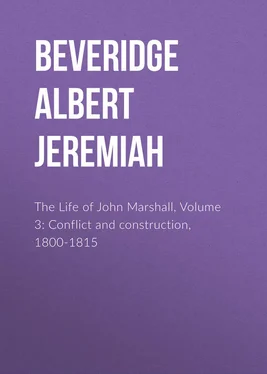March 12, 1802.
March 23, 1802.
March 15, 1802.
Vans Murray to King, April 5, 1802, King, iv, 95.
Sedgwick to King, Feb. 20, 1802, ib. 73.
Ames to Dwight, April 16, 1802, Ames, i, 297.
Annals , 7th Cong. 1st Sess. 201.
Ib. 205.
Ib. 257.
They never occupied the bench under the Federalist Act of 1801. They were appointed, but the swift action of Jefferson and the Republicans prevented them from entering upon the discharge of their duties.
This case was before the Supreme Court in December, 1801, and, ordinarily, would have been decided at the next term, June, 1802.
Annals , 7th Cong. 1st Sess. 1228-29.
Annals , 7th Cong. 1st Sess. 1229.
Ib. 1229-30.
Annals , 7th Cong. 1st Sess. 1235-36.
Ib. 1236. See also Channing, U.S. iv, 280-81.
See vol. ii, 62, of this work.
Ames to Gore, Dec. 13, 1802, Ames, i, 310.
Ib. Here is another characteristic passage from Ames, who accurately expressed New England Federalist sentiment: "The second French and first American Revolution is now commencing… The extinction of Federalism would be followed by the ruin of the wise, rich, and good." (Ames to Smith, Dec. 14, 1802, ib. 313-16.)
Pickering to Peters, Dec. 24, 1803, New-England Federalism : Adams, 338.
Cabot to King, March 27, 1802, King, iv, 94.
Columbian Centinel , April 7, 1802.
"Bowling" in the Independent Chronicle of April 26, 1802. An example of Jefferson's amazing skill in directing public opinion is found in the fact that the people were made to feel that the President was following in Washington's footsteps.
Marshall to his wife, Jan. 2, 1803, MS.
See vol. ii, 502-05, of this work.
Marshall to King, May 5, 1802, King, iv, 116-18.
Since the adoption of the Kentucky and Virginia Resolutions in 1798. (See vol. ii, chaps. x, xi, xii, of this work.)
Since the Republican repeal of the Federalist Judiciary Act was proposed. See supra , 51.
Maryland, Pennsylvania, New Jersey, Delaware, New York, Vermont, New Hampshire, Massachusetts, Connecticut, Rhode Island.
The Federalist majority in Vermont resolved that: "It belongs not to State Legislatures to decide on the constitutionality of laws made by the general government; this power being exclusively vested in the Judiciary Courts of the Union ." ( Records of Governor and Council of Vermont , iv, 529.)
The Federalist majority in the Maryland Legislature asserted that "no state government … is competent to declare an act of the federal government unconstitutional, … that jurisdiction … is exclusively vested in the courts of the United States." (Anderson, in Am. Hist. Rev. v, 248.)
The New York Federalists were slow to act, but finally resolved "that the right of deciding on the constitutionality of all laws passed by Congress … appertains to the judiciary department." ( Ib. 248-49.)
Connecticut Federalists declared that the Kentucky and Virginia plan was "hostile to the existence of our national Union." ( Ib. 247.)
In Delaware the then dominant party decided that the Kentucky and Virginia Resolutions were "not a fit subject" for their consideration. ( Ib. 246.)
The Pennsylvania Federalist majority resolved that the people "have committed to the supreme judiciary of the nation the high authority of ultimately and conclusively deciding the constitutionality of all legislative acts." (Anderson, in Am. Hist. Rev. v, 245.)
On February 8, 1799, Massachusetts replied to the Virginia Resolutions that: "This legislature are persuaded that the decision of all cases in law or equity, arising under the Constitution of the United States, and the construction of all laws made in pursuance thereof, are exclusively vested by the people in the Judicial Courts of the U. States." ( Mass. Senate Journal, 1798-99 , xix, 238, MS. volume Mass. State Library.)
Such was the general tenor of the Federalists' pronouncements upon this grave problem. But because the people believed the Sedition Law to be directed against free speech, the Federalist supremacy in many of the States that insisted upon these sound Nationalist principles was soon overthrown.
The resolutions of the Republican minorities in the Legislatures of the Federalist States were emphatic assertions that any State might declare an act of Congress unconstitutional and disregard it, and that the National Judiciary did not have supervisory power over legislation .
See vol. ii, 387-89, of this work.
Referring to Marshall's conduct in the French Mission. (See vol. ii, chaps. vii, viii, ix, of this work.)
Anderson, in Am. Hist. Rev. v, 249.
Ib. 235-37.
The questions raised by the Kentucky and Virginia Resolutions were principal themes of debate in State Legislatures, in the press, in Congressional campaigns, and in the Presidential contest of 1800. The Judiciary debate of 1802 was, in part, a continuance of these popular discussions.
See supra , 52.
Within a year after Marbury vs. Madison was decided, Albert Moore, one of the Federalist Associate Justices of the Supreme Court, resigned because of ill health and his place was filled by William Johnson, a Republican of South Carolina.
See vol. i, 410, of this work.
March 2, 1801.
Journal of the Executive Proceedings of the Senate , i, 388.
Ib. 390.
Ib. 404. Jefferson did this because, as he said, the appointees of Adams were too numerous.
Journal, Exec. Proc. Senate , i, 417.
See supra , 94-97.
See infra , chap. iv.
This belief is strikingly shown by the comment of the Republican press. For example, just before Marshall delivered his opinion, a correspondent of the Independent Chronicle of Boston sent from Washington this article:
"The efforts of federalism to exalt the Judiciary over the Executive and Legislature, and to give that favorite department a political character & influence, may operate for a time to come, as it has already, to the promotion of one party and the depression of the other; but will probably terminate in the degradation and disgrace of the Judiciary.
Читать дальше












